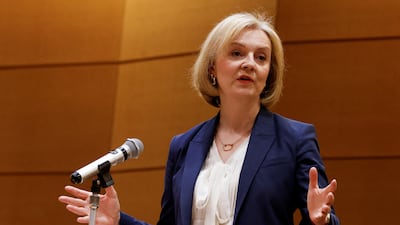The former British prime minister, Liz Truss, is due today to deliver one of the most provocative and irresponsible speeches in living memory at the Prospect Foundation think tank in Taipei, Taiwan. According to a leaked draft, she will declare she is in the island that China regards as a renegade province, “because I believe this is the most consequential place in the world – in the most consequential struggle of our time.”
“Where we are today is on the front line of the global battle for freedom. The Chinese Communist Party is engaged in an ideological struggle with the free world... This is a battle of ideas as much as it is an attempt to grab power on the global stage.”
Referring to tensions in the region that many believe America and its allies are escalating, she is expected to say: “We cannot pretend there can be meaningful deterrence without hard power. And if we are serious about preventing conflict in the South China Sea, we need to get real about military and defence co-operation.”
To further stress her point, she will also say that it is “vital that China is blocked from ever being a member” of the Comprehensive and Progressive Agreement for Trans Pacific Partnership, the 12 member trading bloc that the UK recently joined. China and Taiwan have both applied. Needless to say, Ms Truss enthusiastically supports Taiwanese accession, despite the diplomatic furore that would cause if it ever happened.
Her statements bear little relation to reality. There is no evidence that the Chinese Communist Party is attempting to export its model of governance anywhere. Along with many other countries, China has various border disputes; but it has not tried to “grab power” in any other country. It is in the Asia Pacific’s best interests that China works within the new regional economic architecture, not for it to be kept outside. And the status of Taiwan is not “the front line of the global battle for freedom”, but a dispute left over from the Chinese civil war, as the fact that nearly the whole world recognises some form of the “one China” formula should show.
So-called “friends” who make such statements, wrote the Singaporean public intellectual Kishore Mahbubani recently, “are putting the Taiwanese people in danger and risk inadvertently upsetting the status quo and starting a war… We Asians should unite and send any visiting European policymaker a simple message: by doing nothing [about Taiwan], we have preserved peace in Asia. Why don’t you stay home and fix Ukraine?”
Ms Truss’s intervention is also exceptionally badly timed, if reports are to be believed that voices urging caution over future unification with Taiwan are being given freer rein in China.
It is hard to find a direct parallel, but by way of comparison, imagine how inflammatory it would be if a former G7 head of government turned up in Northern Ireland and demanded the world support their secession from the UK.
It would be asking officials in Beijing to be superhuman not to react. But it would be advisable not to over-react. For Ms Truss is no global statesman. She carries the ignominy of being Britain’s shortest-serving prime minister, lasting not even two months in office before her administration spectacularly imploded. As for her fitness for the role, the widely respected Tory grandee Ken Clarke said shortly afterwards: “I was quite surprised she got into the cabinet, but then I was utterly amazed she became prime minister.” His incredulity was shared by many.
Ms Truss does not represent the UK government, which is hawkish enough on China but still wants a robust and constructive relationship between the two countries. Her trip has even been attacked by a fellow Conservative MP, Alicia Kearns, the chair of the House of Commons' Foreign Affairs Select Committee. “It is deeply unhelpful because it escalates the normal situation in Taiwan,” she said. In reference to the then US speaker of the House who went to the island last August, Ms Kearns added: “Taiwanese people already have to live with more Chinese military manoeuvres because of Nancy Pelosi's visit.”
But Liz Truss is also no Nancy Pelosi, a formidable politician who was the first woman speaker, the first woman to head one of the two major US parties in either chamber of congress, and who was constitutionally second in line to the presidential succession for a total of eight years.
Liz Truss’s message may resonate, unfortunately, with a growing consensus in the Washington foreign policy establishment that views China as an existential threat (never mind that much of the rest of the world disagrees). “Don’t shoot the messenger,” goes the saying. But in this instance, why bother when the messenger is almost a figure of fun, well-known to many of her compatriots for the implausible vehemence with which she once denounced the consumption of foreign cheese?
She is a former head of government of the UK, a permanent member of the UN Security Council and the world’s sixth largest economy. That lends her a status that means her ill-advised speech cannot be totally ignored. But it should be remembered that she only became prime minister because her party had descended into self-destructive turmoil and she managed just 44 days in the job.
The Chinese leadership will be angered by her words. They should not forget, however, that whereas Ms Truss’s steely predecessor, Margaret Thatcher, was once depicted in a TV sketch referring to her ministers as “vegetables”, Ms Truss famously lost a fight for survival with a lettuce, whose shelf life lasted longer than her time in office.
As consequential as her former job was, Ms Truss is not. Beijing should treat her unwise remarks as a mosquito bite – and move swiftly on.


